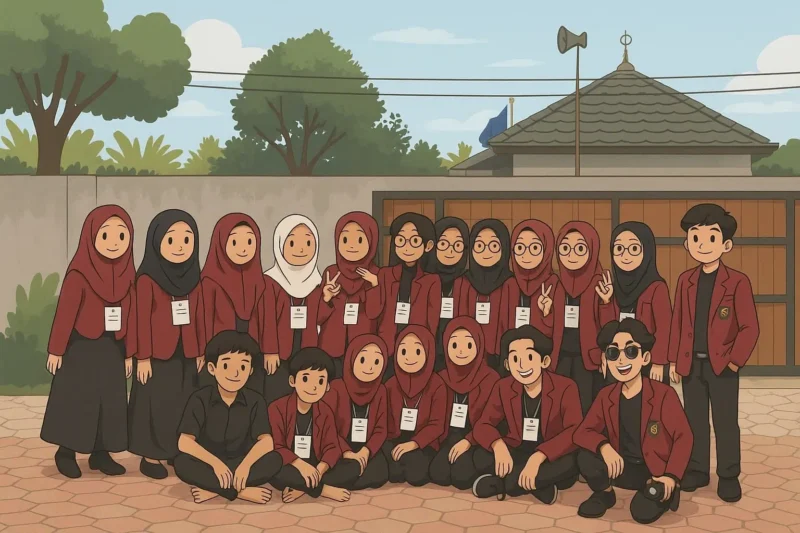Organizations Contribution to the Development of Student Leadership
Student organizations at universities are crucial in helping students develop their leadership skills and get ready to become true leaders. As the country’s future generation, students need to possess a mature leadership spirit in addition to being academically gifted. Under these circumstances, student organizations both on and off campus become a vital platform for students to grow, particularly in terms of leadership.
Students that participate in the organization will encounter a variety of real-world difficulties, including creating work schedules, overseeing activity budgets, negotiating with university stakeholders both internal and external, and making critical decisions in fast-paced circumstances.
For instance, students who are trusted to lead a significant project must possess managerial abilities, good communication skills, and the capacity to settle disputes amicably. These are all core skills in leadership that cannot be obtained only through classroom learning.
Student organizations also serve as a platform for teaching leadership ethics, social responsibility, and democratic principles. Students gain the ability to listen to others, voice their viewpoints intelligently, and look for solutions that put the interests of all parties first in forums or organizational meetings.
Organizations with a communal work culture also instill the value of cooperation and respect for one another. Active involvement in student organizations can expand social and professional networks, which will be very useful when they enter the world of work or the community environment.
Many national leaders and public figures began their leadership journey from the bench of student organizations. Therefore, organizational experience in higher education is not only a complement, but an essential part of the process of forming a student’s character and leadership capacity.
Student Organizations for the Development of Character
In general, students see groups as a way to grow personally and gain a lot of practical experience outside of the classroom. Organizations are thought to be able to teach a variety of critical skills, including strong teamwork, excellent verbal and written communication, time management, and adaptable leadership. Active students are used to talking with a variety of people, including instructors, university officials, and other students, as well as voicing their thoughts in public forums, creating activity reports, and putting up recommendations.
Some students also think that organizations are an opportunity to learn how to face challenges directly. For example, when there is an internal team conflict, students learn to solve problems through dialogue and deliberation. When experiencing limited funds, they learn to find solutions through sponsorship or fundraising. This trains mental toughness, creativity, and the ability to adapt to difficult situations.
Therefore, student groups serve as a microcosm of real life that helps students develop into more responsible, mature people who are equipped to handle issues in the global community, in addition to providing a setting for “practicing” soft skills and leadership.
Issues with Organization from the Viewpoint of Students
Students opinions on how groups influence leadership, however, differ. The issue at hand is that many students still believe that groups can be a time and energy waster that disrupts their ability to concentrate in class, particularly if they are unable to prioritize their academic work and their involvement in organizations.
Additionally, because they receive too much seniority, some students believe that certain organizations do not fully promote positive personalities. Additionally, other pupils are influenced to follow an early organization by the unfavorable opinions of their peers. Discussing these divergent opinions is crucial if student groups are to continue evolving into a productive platform for developing future leaders.
So, the purpose of this article is to address students opinions regarding the role that organizations play in developing leaders, as well as the issues that arise when students have unfavorable opinions about organizations and how to change those opinions to favorable ones.
Baca Juga: The US-China Trade War from the Indonesian Student Perspective: Is It a Threat or an Opportunity?
Techniques to Modify Students Adverse Perceptions of Organizations
To reconcile divergent student opinions on the organization, particularly those that are unfavorable. Specifically, through the facilitation of open dialogue and discussion forums, all students are able to express their opinions. Regular forums are also held to accommodate aspirations and assess organizational activities; in these forums, students not only express their opinions but also serve as a venue for resolving these differences.
Furthermore, it is crucial to hold a cadre process and organizational education since it is crucial to give new pupils organizational education. As a result, the organization gives students the chance to exercise leadership qualities like accountability, sound judgment, and effective communication.
The context, unpleasant experiences, or a lack of knowledge about the organization’s advantages are the main causes of students unfavorable opinions of it. Students may become less motivated to take part in group activities as a result. Therefore, companies must focus on coaching that will make students feel at ease and build members, such as those free from selective seniority. Then, by developing an enjoyable job program, kids are encouraged to join the organization.
Also, there are a number of actions that can be made to pique students curiosity and alter their unfavorable opinions of the company. Specifically, by developing partnership or internship programs off campus, the organization helps students see how valuable their experience is in the workplace. Additionally, rewarding active and accomplished members of the group serves as both an intrinsic motivator and an indirect way to pique students interest in the group.
The purpose of joining the organization, the aim of each student, and avoiding being swayed by the unfavorable opinions of other students are next discussed. There are undoubtedly advantages and disadvantages to every organization, depending on how it is operated. Students may learn an important lesson if they have terrible experiences. When the learner later has a position in an organization, the deficiencies they experienced can be evaluated and corrected.
Baca Juga: Incidents of Bullying: Bullying among Students is Widespread in Indonesia
Also, there are a number of actions that can be made to pique students’ curiosity and alter their unfavorable opinions of the company. Specifically, by developing partnership or internship programs off campus, the organization helps students see how valuable their experience is in the workplace.
Additionally, rewarding active and accomplished members of the group serves as both an intrinsic motivator and an indirect way to pique students’ interest in the group. The purpose of joining the organization, the aim of each student, and avoiding being swayed by the unfavorable opinions of other students are next discussed.
There are undoubtedly advantages and disadvantages to every organization, depending on how it is operated. Students may learn an important lesson if they have terrible experiences. When the learner later has a position in an organization, the deficiencies they experienced can be evaluated and corrected.
Developing Student Leadership using Institutions
Organizations have a significant impact on how students develop as leaders. Being a part of an organization involves more than just roles and committees; it also involves the process by which students develop into capable, strong adults and eventual leaders.
The author of this post suggests that you should not be afraid to become active in an organization because even tiny actions now can lead to tremendous leadership in the future. The author of “The 21 Irrefutable Laws of Leadership”, John C. Maxwell, once stated, “A leader is one who knows the way, goes the way, and shows the way”.
Penulis: Zalfa Naurah Fadhilah
Mahasiswa Program Studi Pendidikan Bahasa Arab Universitas Muhammadiyah Prof. Dr. Hamka
Supervisor: Dr. Muhammad Iman Sastra Mihajat
Editor: Ika Ayuni Lestari
Bahasa: Rahmat Al Kafi
Ikuti berita terbaru di Google News















